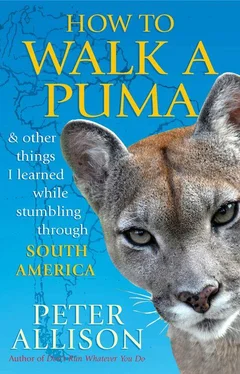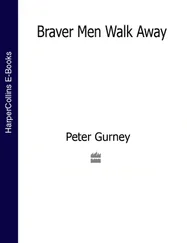‘We cannot follow her,’ he said. ‘Those tracks were so tiny! If we go too close to her babies, she will kill us.’
‘Is there a way around?’ I asked, desperate hope in my voice.
Marcello pondered, then slowly shook his head. ‘Not here, not now. We can try further along in the car later tonight. Maybe they will come out.’
That night we bundled into Marcello’s four-wheel drive, and with flashlights pointing from each window and a spotlight mounted at the front, drove along the roads in the area. Capybaras glared at us, moving off the road at the last possible moment, a crab-eating fox trotted gaily along beside us before scurrying into brush, and a raccoon with some small prey in its mouth crossed our beams, but sadly no jaguar emerged.
Even after returning to the campsite I was wired with suspense, and barely slept, excited and frustrated at having been so close to seeing a jaguar only to miss out.
The next day the Minke and I had to move on. We did so with a refreshed outlook on what it means to be lucky, after hearing Marcello’s story. It was impossible to be disappointed by our time with him, and I remained optimistic that a jaguar waited for me somewhere down the dirt tracks of South America.
Things I Learnt After the Quake

Together, Parque Machia, Patagonia and the Pantanal had chewed through almost six months of my time in South America. I returned to visit Marguerite and Harris in Santiago, this time with the Minke in tow. As is so often the case when I’m travelling I was broke, and waiting for a royalty payment that was due, so we spent more than a week in Santiago. While we thought we were coming to Santiago for a respite from adventure, fate had other ideas in mind.
Lisa was also happy to have a brief break from life on the road, and we arrived in Santiago grateful for a safe place, a warm and homely base from which we planned to explore the tadpole tail of South America before moving back up into the bulge of Bolivia and Brazil. As previously, I did not expect much from nature in this orderly city. In fact, Chile was so civilised, so well organised, that I’d felt a tinge of selfish disappointment when we decided to return there. The whole reason I had come to South America was to be challenged, to escape the tame, but Santiago felt like Sydney with a Spanish accent. I had no idea it was the place where I would feel nature’s force at its greatest, nor a place that would compel me to change my opinions of humanity.
Staying at the Gomezes’ also gave Lisa and me some time in a more private setting to explore our new relationship—still in its early, awkward stages. I’d realised the inadvertent danger of sharing a bathroom. I am thrilled that humans have overcome natural selection enough that a woman can find me attractive despite my myriad flaws, and wanted to maintain that honeymoon period for as long as possible.
So it was with some force that I prevented her from brushing her teeth soon after I had left the bathroom one evening. ‘Why can’t I go in?’ she asked. I had no reasonable answer so I said, ‘It’s haunted.’
‘What?’
Realising I’d backed myself into a corner I admitted, ‘Okay, not haunted, but it does smell like something died in there.’
‘You’re a fool,’ she replied, pushing past me, and I had an inkling it wouldn’t be the last time she said that.
One day during our stay, the Minke and I went to a local bar to watch her beloved Welsh rugby team play France. Wales lost. During the game the Minke revealed a side of her personality I had thus far not witnessed; while never demure, as she watched she became incensed, screaming at the screen, shaking her fist and generally scaring into cautious silence a small cluster of French fans seated nearby.
‘Holy crap. My girlfriend is a guy,’ I thought but didn’t dare say. To reinforce my suspicion, when the game was over she drowned her sorrows with copious volumes of liquor, an amount that even my steel-plated liver couldn’t keep pace with, so I didn’t try.
•
At 3.34 the next morning I woke, feeling disoriented and confused by a noise I’d never heard before and a world out of control. I grabbed the Minke and insisted she get out of bed.
‘I’ve been through worse,’ she insisted—a blatant lie—and rolled over, the mattress bouncing as she did so, not because of her movement but because the whole house was bucking like a bull with an unwanted rider on its back. Time spent in Japan and San Francisco meant that I was familiar with earth tremors, but this was unlike anything I’d experienced before. The windowpanes pulsed violently against their frames, and I could hear waves, a bizarre noise this far from the coast. Later I realised it was the swimming pool, which in daylight revealed itself to be half-full due to the force that had thrown its contents onto the surrounding lawn.
With Lisa reluctantly upright, we staggered towards the bathroom doorframe. A wall came out of nowhere and bounced us to the side, then the opposite wall jabbed us back again. Nothing is as perturbing as being beaten up by a house, but we only had a few paces to go.
‘Now you want me to go to the bathroom!’ the Minke grumbled.
When we reached the doorway I bullied the still-complaining Minke against the frame, and stood panting from the effort and adrenalin. We were on the second floor of the house, and I could see no way of us surviving if the house collapsed, which began to seem increasingly inevitable as the quake continued.
Later I would learn that the quake had lasted just over forty seconds, but at the time it felt like an aeon. I believed that standing in the doorway was our safest option, and slyly figured that any falling objects would land on the Minke before me anyway. (However, after the quake I heard of some controversial research that indicates standing in a doorway or getting under a table may not be the best strategy, as rescuers often find survivors in a ‘triangle of life’ when they have fallen beside a bed or table and a collapsed ceiling hit the bed first; even if the bed breaks, the person beside it is safe as it tends to angle over them.)
‘I’m going out to check on the others,’ I said once the shaking had subsided.
Lisa, who was either still drunk or suicidally forlorn over her rugby team’s loss, said, ‘I’m going back to bed.’ And she did, maintaining a far straighter line to it than before.
I heard voices in the hallway and found the entire family Gomez—Harris, Marguerite and their two daughters—gathered in various states of pyjamery outside the cluster of bedrooms that made up the house’s upper floor.
‘Why is the house driving?’ the five-year-old asked, a beautiful description of the grinding pulses we had just felt. Marguerite had tears in her eyes and was still shaking visibly. Harris asked after Lisa, and I explained she was back in bed.
‘She’s tough,’ said Harris, eyebrows raised in admiration.
‘Drunk actually, but how are all of you?’ I replied.
Once we’d ascertained that everyone was fine, Harris and I went off to check if there was any damage to the house. The electricity was out, and when we turned to look out the window the view stunned us both. The house was built on the side of a dormant volcano, and overlooked a valley that stretched into central Santiago. Usually the city winked and sparkled at night; now there was nothing but the occasional red flare of an emergency light. There was nothing to tell us whether a city of seven million people still stood. In the gloom around us all that was clear was that a neighbour’s house remained upright, but it was impossible to know what had happened beyond that.
Читать дальше













